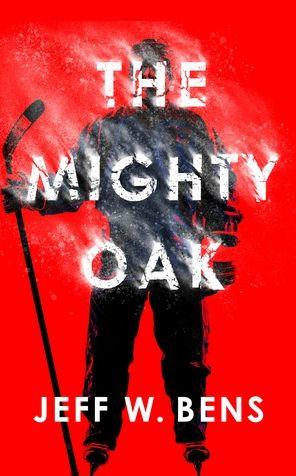
SPORTS FICTION
Jeff W. Bens
Blackstone Publishing
Hardcover (also available as an e-book and audiobook), 978-1-9826-046-5, 272 pgs., $25.99
September 15, 2020
Jeff W. Bens’s novel The Mighty Oak is a deep, intense, eye-opening look at the dangers of staying too long in a violent sport and the hard choices that must be made to find new paths forward.
Professional hockey player Tim “Oak” O’Connor’s career is swirling down the drain while he skates for the El Paso Storm, in the end-of-the-line West Texas Hockey League. He has no idea what he’ll do once he’s too old and too battered to stay on the ice and earn a meager paycheck. But on the team bus heading toward the Storm’s next match, Oak “hears the blood ringing in his brain. He just needs ice time. To get out of Texas and back up a league. And then another league, up to where he belongs,” he tells himself.
Much of Oak’s character rises from staccato flows of interior monologue, quick glimpses of memories, and his terse responses to questions and situations, when Oak chooses to respond at all. The author also holds tensions high by keeping dialogue and descriptions taut while his plot moves steadily forward.
After years in some of hockey’s top leagues starring as an “enforcer,” a player who physically avenges dirty actions by opposing teams, Oak has slumped into a physical wreck with growing mental health issues. He’s still big and hulking, yet he’s now held together with surgical repairs, an addiction to painkillers, emotional numbness, sometimes-addled thoughts, and too much alcohol. He knows he’s probably also developed chronic traumatic encephalopathy (CTE), the progressive, degenerative brain disease that can affect people who’ve suffered multiple concussions and head jarring. In games and in fights away from the rink, he’s received and meted out countless fists to the face, head butts, and body blows. Yet hockey remains all he wants to do in life.
When Oak’s mother dies, he goes home to Boston and confronts both his past and his ex-wife and teenage daughter, whom he hasn’t seen in several years while bouncing from one hockey franchise to another. Some people still recognize him and treat him like a star. Others, however, question why he’s completely lost touch with them. What they don’t see—and what gives this absorbing story much of its power—are the emotional turmoil, fading memories, and unsteady thoughts that keep unfolding inside Oak’s mind as he tries to deal with his growing limitations.
In real life, CTE can affect professional and amateur athletes of almost any age in contact sports such as football, hockey, boxing, and more. Sometimes, it can emerge years after stopping play. There’s no cure yet, but determined athletes sometimes try to hide their lingering injuries and CTE symptoms to avoid getting benched or cut from a team. Some end up addicted to pain killers, alcohol, or illegal drugs. Oak is drawn into that dark world even as he fights to free himself from it.
The Mighty Oak is first-rate fiction for adult readers. The book’s roots in reality and confidence issues should hold special appeal for many who relish contact sports, yet also understand their inherent dangers.
Jeff W. Bens is the author of the novels Albert, Himself and The Mighty Oak and director of the award-winning documentary film Fatman's. His short fiction and essays are published widely. Bens was a founding faculty member of the School of Filmmaking at the University of North Carolina School of the Arts and has served on film festival juries around the world. He currently directs Manhattanville College’s undergraduate creative writing program and teaches both undergraduate and graduate workshops in creative writing.
